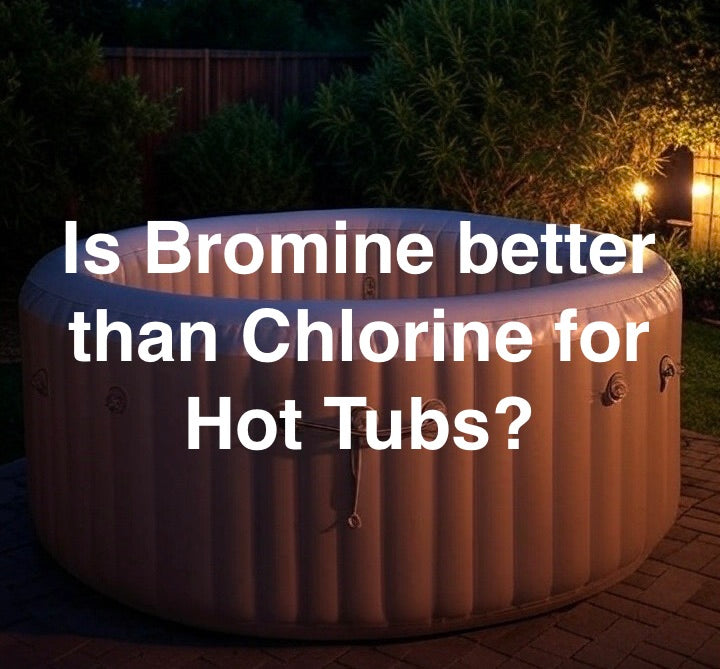
Is Bromine better than Chlorine for Hot Tubs?
Hot tub wars: bromine vs chlorine— which keeps inflatable spas cleaner, safer, and friendlier on your skin? Short answer: bromine is gentler and longer-lasting, but chlorine works faster and costs less. Stick around as we break down the bubbly details so your soak stays relaxing, not risky.

The Key Differences: Bromine and Chlorine Explained
Before we dive too deep, let’s get the basics sorted. Both chlorine and bromine sanitise your hot tub water, but they do it in very different ways.
Think of chlorine as the sprinter—fast, powerful, and quick to act. Bromine, on the other hand, is more like the marathon runner—steady, reliable, and built to last in hot water.
How Chlorine Works
Chlorine jumps into action the moment it hits your water. It attacks bacteria and clears up cloudy water fast. That’s why it’s the go-to for pools and many hot tubs.
The downside? It can sometimes leave you with that tell-tale “swimming pool smell” and, if not balanced properly, dry out your skin.
How Bromine Works
Bromine works differently. Instead of burning out quickly, it keeps on fighting long after you’ve added it. It lingers in the water, quietly tackling bacteria and other nasties.
It’s also softer on the skin and eyes, making it a favourite for families or anyone with sensitivities. And bonus—it doesn’t leave you smelling like a leisure centre afterwards.
The Role of pH and Temperature
Both sanitisers rely on pH balance to work properly. But bromine shines in hot water, staying stable even at higher spa temperatures.
Chlorine can lose its punch if the pH drifts too much, which is why it needs a bit more attention to stay effective.
Pros and Cons of Bromine
Bromine’s Advantages
-
Holds up brilliantly in hot spa temperatures
-
Kinder on skin and eyes than chlorine
-
Produces less odour, perfect for indoor setups
-
Remains active for longer, reducing top-ups
Bromine’s Disadvantages
-
More expensive to buy initially
-
Sensitive to sunlight, so best used with a spa cover
Pros and Cons of Chlorine
Chlorine’s Advantages
-
Acts fast against bacteria and contaminants
-
Budget-friendly and widely available
-
Clears cloudy water almost instantly
Chlorine’s Disadvantages
-
Stronger smell that clings to skin and swimsuits
-
Can be irritating to sensitive skin or eyes
-
Less effective in higher spa temperatures

Side-by-Side Comparison: Bromine vs. Chlorine
Effectiveness at High Temperatures
Bromine thrives in the hot, steamy world of spas, while chlorine can struggle to keep up.
Odour and Skin Sensitivity
Bromine is the gentler choice, with minimal smell. Chlorine works, but some soakers end up itchy or irritated.
Cost and Maintenance
Chlorine is cheaper at the start, making it attractive for budget-conscious families. Bromine costs more but often lasts longer, meaning fewer top-ups in the long run.
Longevity and Stability
Bromine hangs around, giving you steady protection. Chlorine, meanwhile, burns off quicker—especially in sunlight.
Choosing the Best Option for Your Hot Tub
When to Choose Bromine
Go for bromine if you’ve got sensitive skin, use your spa indoors, or don’t fancy topping up chemicals every other day.
When to Choose Chlorine
Pick chlorine if you want quick results, are keeping costs down, or have an outdoor spa where sunlight is less of an issue.
What if I Want to Switch?
You can switch sanitisers, but you’ll need to fully drain and clean your spa first. Never add bromine to chlorine-treated water (or vice versa)—that’s a chemical clash you don’t want bubbling up in your garden.
Conclusion and Key Takeaways

Whether you’re team bromine or team chlorine, the most important thing is keeping your spa water safe and sparkling.
-
Bromine is best if you want long-lasting protection, gentler water, and fewer top-ups.
-
Chlorine is ideal if you’re looking for speed, lower costs, and don’t mind a bit of extra upkeep.
-
Whichever you choose, test your water regularly, keep the pH balanced, and never mix the two.
At the end of the day, the “right” sanitiser is the one that fits your lifestyle, budget, and how you use your inflatable spa. Choose wisely, and every soak will feel like pure bliss.
Have you checked out our other posts?
Is 10 Years Old Too Young For A Hot Tub?
Can I Put Epsom Salt In My Inflatable Hot Tub?
Can You Put Pool Shock In An Inflatable Hot Tub?
Do I Need Chlorine In An Inflatable Hot Tub?
Can You Use Saltwater In An Inflatable Hot Tub?



Leave a comment